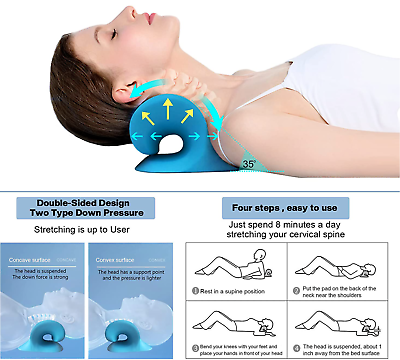Improve Your Posture and Reduce Neck Discomfort with the Neck Cloud
Wiki Article
The Effect of Tension on Neck Pain: Methods for Lowering Stress and Pain
In today's busy world, it's clear that anxiety has actually become a widespread consider the beginning and worsening of neck pain. The complex partnership between anxiety and muscular tissue tension usually leaves individuals seeking remedy for the pain that ensues. By checking out targeted approaches focused on decreasing stress and advertising leisure, one can start to resolve the root triggers of neck pain and job in the direction of an extra balanced state of well-being. Join us on a journey to unwind the influence of stress on neck pain and find efficient methods to relieve discomfort and enhance overall high quality of life.Recognizing Stress-Related Neck Discomfort
Stress-related neck discomfort can materialize as tension, stiffness, or discomfort in the neck and shoulder location. The connection between stress and anxiety and neck pain lies in the body's physical feedback to anxiety, which can result in muscular tissue stress and tightness in the neck muscular tissues.
Identifying Common Stress Areas
Regularly experienced by individuals under stress and anxiety, tension areas in the body can give useful understandings into the physical symptoms of emotional strain. One typical stress area is the neck, where anxiety frequently materializes literally. Tension migraines, stiff neck muscle mass, and limited series of motion are typical signs and symptoms of stress-related neck tension. The shoulders are another typical location where stress accumulates. Stress and anxiety can cause the muscle mass in the shoulders to tighten, causing pain and discomfort. In addition, the upper back is prone to tension build-up, especially in individuals that experience persistent tension. Poor pose and extended resting can aggravate stress in this field. The jaw is also a typical area for stress-related stress, as many people clench their jaw or grind their teeth when stressed. Being aware of these common tension areas can help individuals recognize the physical signs of tension and take steps to address them before they rise right into persistent discomfort or pain.
Implementing Leisure Strategies
To successfully handle stress-related tension in the body, implementing leisure techniques is important. Leisure methods are useful devices for reducing neck discomfort brought on by tension. Deep breathing exercises can aid soothe the mind and relax stressful muscle mass in the neck and shoulders (neck cloud). Practicing mindfulness reflection can also be advantageous in alleviating anxiety and promoting leisure. click this link Progressive muscular tissue relaxation, where you systematically strained and after that loosen up different muscular tissue groups, can launch built-up tension in the neck location. Additionally, activities like yoga exercise and tai chi integrate both physical activity and relaxation, making them reliable practices for lowering tension and neck discomfort. Taking regular breaks throughout the day to stretch and loosen up can prevent muscular tissue stiffness and tension from building up. By including these relaxation methods right into your daily regimen, you can help handle stress and anxiety levels, minimize stress in the neck, and relieve discomfort linked with stress-induced neck pain.Incorporating Self-Care Practices
Incorporating self-care techniques is essential for preserving general wellness and managing stress-related neck pain efficiently. Engaging in routine exercise, such as mild extending workouts or yoga, can aid alleviate stress in the neck and shoulders. Practicing good posture throughout the day and taking frequent breaks from prolonged resting or display time can additionally protect against pressure on the neck muscle mass.Additionally, prioritizing adequate rest and developing a regular rest regimen can contribute considerably to decreasing tension levels and advertising leisure. Creating a relaxing bedtime routine, such as checking out a publication or taking review a cozy bathroom, can assist prepare the body and mind for relaxed sleep. Furthermore, maintaining a balanced diet rich in nutrients and staying moisturized can support overall wellness and lower swelling that may exacerbate neck discomfort.
Integrating mindfulness practices, such as deep breathing workouts or meditation, can aid handle stress and advertise relaxation. Taking time for oneself, involving in pastimes, and establishing limits to protect individual time are also vital elements of self-care that can add to minimizing stress and reducing neck discomfort.
Seeking Specialist Help
Just how can individuals properly attend to relentless neck discomfort that is impacting their day-to-day life and well-being? Seeking professional aid can be a vital action in handling and easing neck pain.Chiropractics physician specialize in back adjustment techniques to boost positioning and reduce tension in the neck area. Physical specialists provide targeted stretches and exercises to strengthen muscles, boost versatility, and boost total neck feature. Orthopedic professionals can offer innovative clinical treatments such as injections or medical choices for extreme situations of neck discomfort.
Final Thought

Stress-related neck discomfort can show up as stress, rigidity, or pain in the neck and shoulder area. The connection between stress and neck pain lies in the body's physical response to stress, which can result in muscle stress and rigidity in the neck muscles. Stress frustrations, tight neck muscular tissues, and limited array of activity are usual Discover More signs of stress-related neck tension. By incorporating these relaxation techniques right into your day-to-day regimen, you can assist handle tension levels, reduce stress in the neck, and minimize discomfort connected with stress-induced neck pain.

Report this wiki page